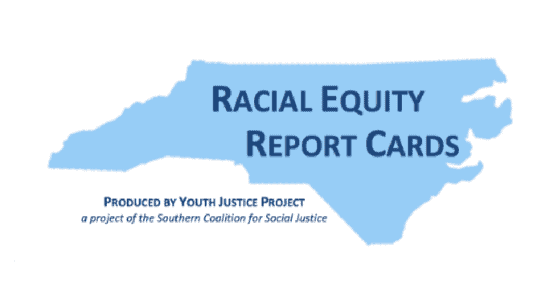For media inquiries:
Michelle Rash
mrash@rlfcommunications.com
336-553-1733 (office)
336-823-5501 (mobile)
Durham, N.C. — While Black students made up 24.8% of children in North Carolina public schools, they received 54.9% of all short-term suspensions during the 2019-2020 school year, which ended in-person learning for students statewide in mid-March 2020 due to the COVID-19 pandemic. White students, who comprise 45.5% of all students, only received 26.0% of all suspensions. These and other findings of disparity are detailed in the 5th annual statewide Racial Equity Report Card issued today by the Southern Coalition for Social Justice.
The Racial Equity Report Cards (RERCs) use public data to provide a snapshot of the school-to-prison pipeline in each of the state’s 115 school districts as well as the state as a whole. The school-to-prison pipeline is the system of policies and practices that push students out of school and into the juvenile and adult criminal justice systems. The pipeline has three key entry points: academic failure, school discipline and court involvement. Students of color are overrepresented at each entry point to the pipeline in almost every school district in North Carolina. Once students enter the pipeline, it can be difficult for them to re-engage and be successful at school.
This year’s report cards primarily use 2019-2020 academic year data, which is limited due to the impact COVID-19 had on schools and students. For example, North Carolina did not release data on end-of-grade and end-of-course tests at the end of the 2019-2020 school year, so that information is not available for inclusion in this year’s report cards.
“The changes of the past year have significantly increased attention on how safe students are in the classroom. But as school districts work to ensure students are physically safe in schools amid COVID-19 concerns, they also need to take action to protect students from the harms of institutional inequity and racism,” said Tyler Whittenberg, Chief Counsel for Justice System Reform with the Southern Coalition for Social Justice. “As indicated by the 2019-2020 RERCs, much work still needs to be done, including reducing the use of exclusionary discipline and limiting the number of students who enter the justice system via the classroom – two practices that disproportionately and detrimentally impact students of color throughout North Carolina.”
Key findings of the 2019-2020 North Carolina RERC include:
- Black students were 3.9 times more likely than white students to receive a short-term suspension.
- Statewide, 29.9% of all juvenile referrals to the criminal justice system came from schools, down significantly from 45.1% in the 2018-2019 RERC. However, Black students remain disproportionately impacted, accounting for 49.0% of all incidents being referred to the criminal justice system compared to 35.2% among white students.
- While 54.5% of students in North Carolina schools are people of color, only 23% of teachers are. Having a diverse school staff is one way to help equalize opportunities for students of color.
- Latinx students are the least likely to graduate from high school in four years, with statewide graduation rates of 81.7%. In comparison, 90.8% of white students graduate in 4 years.
“Over the past year, we have seen a growing, often student-led movement, to remove school resource officers from North Carolina schools and focus on creating an environment where all students feel safe and included,” Whittenberg said. “As schools are already reimagining how they provide equal access to education to all students, we encourage them to consider the racial impacts of their actions and take further action to create an equitable learning environment for students of color.”
Additional information about the school-to-prison pipeline and Racial Equity Report Cards for each school district can be found at rerc.southerncoalition.org.
###
The Southern Coalition for Social Justice, founded in 2007, partners with communities of color and economically disadvantaged communities in the South to defend and advance their political, social, and economic rights through the combination of legal advocacy, research, organizing and communications. Learn more at southerncoalition.org and follow our work on Twitter and Facebook.

